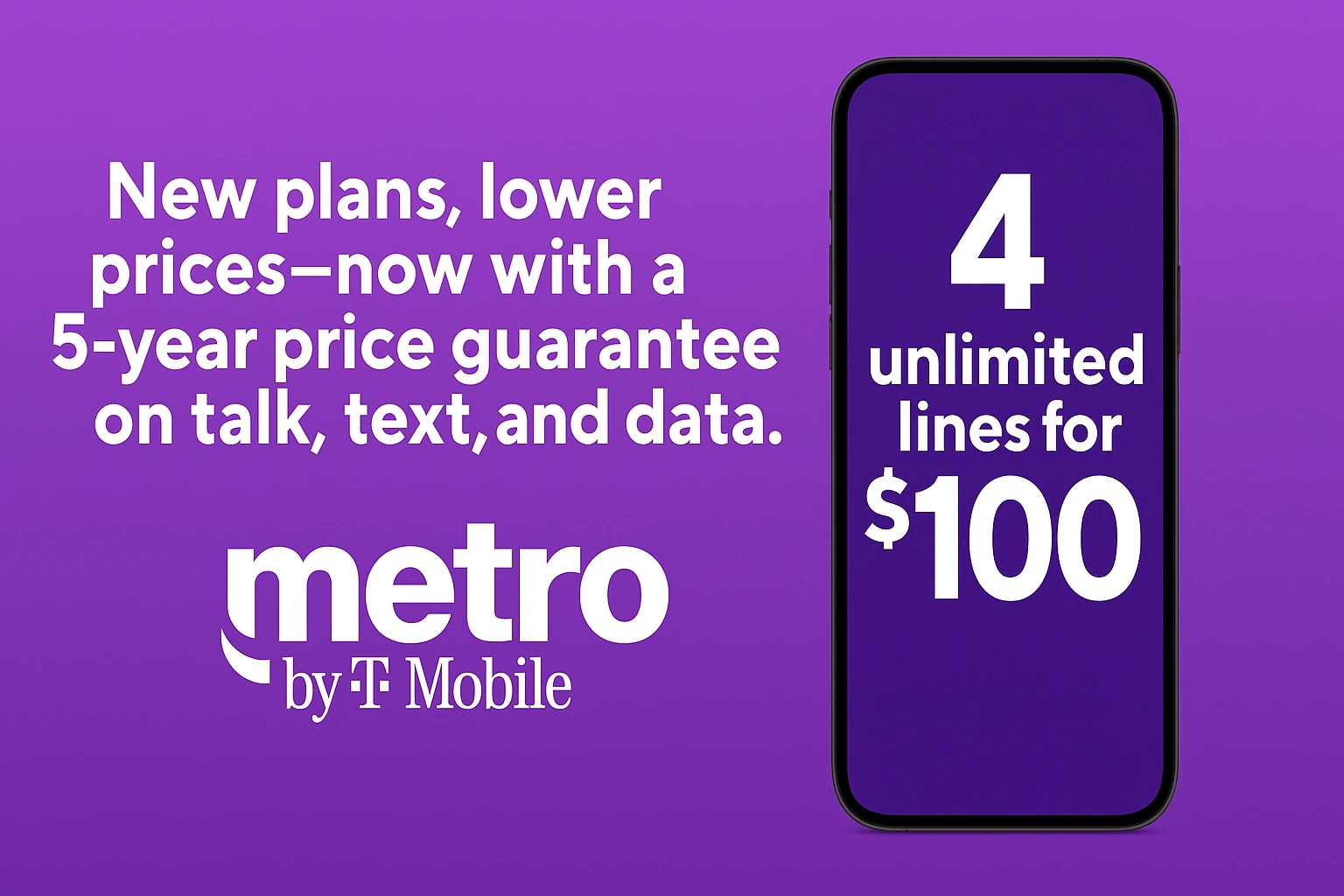Advertisement
Live today are new plans from Metro by T-Mobile. T-Mobile announced their pending arrival a couple of days ago via a press release. The new plans offer lower price points with the main unlimited plan options now costing $40, $50, and $60 per month with autopay billing enabled. Each plan also come with a 5 year price guarantee.
Does all of this sound familiar? That's because it is. The new price points and price guarantee were directly lifted from Verizon's prepaid Value Brand, Total Wireless, which also offers truly unlimited plans at the same three price points with the same long-term price lock.
Metro’s new plans retain a lot of the same structure as their previous offerings but come with new names, slight feature adjustments, and a $10/month reduction for single lines. Multi-line subscribers now receive deeper discounts than before.
Here’s a breakdown of what’s changed (previous pricing shown in parentheses):
| Starter Plus | Metro Flex Unlimited | Metro Flex Unlimited Plus | |
|---|---|---|---|
| Previous Plan Name | Flex Start | Metro Flex Up | Metro Flex Plus |
| Single Line Price | $40 | $50 ($60) | $60 ($70) |
| 4-Line Price | $100 | $120 ($165) | $140 ($175) |
| Hotspot | No | 8GB | 25GB |
| 100GB Google One | No | Yes | Yes |
| Amazon Prime | No | No | Yes |
| HD Video | No | No | Yes |
| Scam Shield | Yes | Yes | Yes |
| T-Mobile Tuesdays | Yes | Yes | Yes |
| $5/month watch/tablet lines | No | No | Yes |
| Unlimited International Texts | No | No | Yes |
| Upgrades included on phones | No | Yes | Yes |
As shown by the highlights, the Starter plan received a couple of downgrades in exchange for a lower starting price. It no longer includes 8GB of hotspot data or a Google One membership. The Metro Flex Unlimited plan also received a couple of downgrades. The mid-tier priced unlimited plan used to include 25GB of hotspot data, but now only has 8GB. It also used to include unlimited international texting, a feature now reserved for the flagship offering. On the plus side, the Metro Flex Unlimited Plus plan now allows HD video streaming (previously limited to 480p).
All plans include taxes and fees in the listed prices. The two higher-tier plans have a $5/month autopay discount already factored in. Notably, the Starter Plus plan does not qualify for an autopay discount. The plans remain deprioritized, and customers that use more than 35GB of high-speed data during a billing cycle will have their data speeds further deprioritized.
Oddly, Metro has made the Starter Plus plan harder to access. It's now only available in-store and only for customers porting in a number. The other plans can be purchased online at Metro. This restriction seems like a deliberate move to push self-service customers toward the more expensive plans.
Complicating things further, Metro still offers a $25/month store-only unlimited plan for BYOD customers. This plan mirrors the $40 Starter Plus plan in features but has a different name, simply called "Unlimited BYOD". Customers visiting stores with their own phones should be cautious not to be steered toward the more expensive version unnecessarily, which should be reserved for customers needing to get a phone from Metro.
Additionally, Metro has discontinued its hidden "Heritage" plans, which offered cheaper unlimited options than their outgoing main lineup did.
The new plans are already being supported by a new video ad from Metro.
Editor's Take
Last year, when Metro introduced its Flex plans I wrote that they were full of gotchas and designed to lock you into paying more. The Flex plans were a price increase over the outgoing plans. Now, ironically, the old pricing has returned and that’s a welcomed change. These plans are now more affordable and competitive, especially for families or multi-line users. However, I think Verizon forced Metro's hand. Verizon has been putting a lot of effort into its prepaid brand Total Wireless by offering aggressive promos and rapidly opening branded stores. The effort seems to be paying off. Verizon recently announced they added 137k prepaid subscribers during the first quarter of 2025, compared to 131k losses in the first quarter of 2024.
Total Wireless was first to introduce the five-year price guarantee, and now Metro has followed suit. Single-line pricing is now identical between the two brands. Multi-line pricing varies. Metro may be cheaper in some cases, Total in others. For example, Metro’s three plans cost $65, $80, and $95 for two lines, while Total charges $80, $85, and $95. Both offer a four-line bundle of the base plan for $100, but Total’s higher-tier family plans are $10 cheaper than Metro’s.

l’MMA say ths again with T-mo about 2 takeover US Cellular; VERIZON SHLD BEC0ME THE NEW UNCARRIER CUSTOMER FRIENDLY PROVIDER at number 1 they can afford 2 benefit the customers. ATT and Boost are no threat 2 anybody. l see ATT eventually buyn’ Boost.